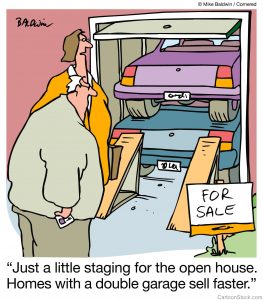 When it comes to selling a home, first impressions are everything. While curb appeal serves as the door opener, what’s inside the door plays an equally significant role in the overall allure of a property. The inside is where owners have taken the liberty of exercising their personality and creativity, which in all practicality most often does not match up with the vision of a new buyer. That’s where staging comes in.
When it comes to selling a home, first impressions are everything. While curb appeal serves as the door opener, what’s inside the door plays an equally significant role in the overall allure of a property. The inside is where owners have taken the liberty of exercising their personality and creativity, which in all practicality most often does not match up with the vision of a new buyer. That’s where staging comes in.
There are two parts of staging that are critical. The first is a no-brainer, which is to simply declutter. The second part is what can ruffle the feathers of a seller – replacing items with generic props. The intent is to make the house neutral and attractive, so a buyer can envision themselves and “their” belongings in the space. It all makes perfect sense until the change occurs, and the seller is sitting in their home looking at the generic oddments, far less interesting than what they collected. Add to this the natural interpretation that what they had was not “good enough,” or worse, perceived as distasteful.
As a seller, you may be fine with it all, trusting the agent and stager that it’s in the best interest of selling the house. Statistics support this as staged homes often sell faster and for a higher price. Also, ifthe house is empty, it’s no sweat. It’s not so personal. However, if you are the seller and living there while the house is on the market, you need to be comfortable as there is no guarantee if it will sell in a week or several months.
I recently had a client who agreed to “light staging.” The stager sprinkled the space with a few fresh furniture pieces and artsy items, but where it began to bother them was changing up their bookshelves. For a small house, it had an excessive number of books, and without clearing some out, it looked cluttered. Of course, as items were removed there was a void, requiring the stager to put something in the space to balance it out. The seller was fine the first few days post staging, but then I got a call saying they were on their way over to drop off some of the props that “weren’t them.” In fact, every few days they dropped of another box of “stuff,” then another, and another, until my garage was full of boxes filled with staging items. True to statistics however, the staging job was perfect for the house, perfect for the photos, and we were under contract in 10 days.
Staging can be beautiful when done by seasoned professionals, but there can also be a “staged look.” For example, fake plants, fake flowers, fake food, fake TV screens and computers should try to be avoided at all costs. Another no-no is the “beach look” with abundant turquoise, starfish, and coral everywhere to the point where it looks like Home Goods threw up in the space.
Like anything, communication is important. If you are selling and unhappy with the staging, a simple conversation needs to take place. Any good agent will coach a seller on what is in their best interest, even if the home is already “Practically Perfect”.
 By Kelly Perkins
By Kelly Perkins
Kelly Perkins is a realtor with Villa Real Estate in Laguna Beach, working in partnership with John Stanaland. She can be reached at kperkins@villarealestate.com



